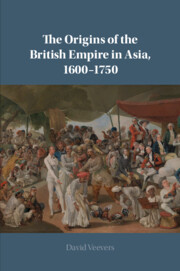Description
The Origins of the British Empire in Asia, 1600–1750
Author: Veevers David
A revisionist interpretation of the origins of the British Empire in Asia from 1600 to 1750.
Language: English
Subject for The Origins of the British Empire in Asia, 1600–1750:
Approximative price 39.35 €
In Print (Delivery period: 14 days).
Add to cart
The Origins of the British Empire in Asia, 1600-1750
Publication date: 03-2022
Support: Print on demand
Publication date: 03-2022
Support: Print on demand
Approximative price 102.80 €
In Print (Delivery period: 14 days).
Add to cart
The Origins of the British Empire in Asia, 1600-1750
Publication date: 06-2020
318 p. · 15.7x23.5 cm · Hardback
Publication date: 06-2020
318 p. · 15.7x23.5 cm · Hardback
Description
/li>Contents
/li>Biography
/li>
This is an important, revisionist account of the origins of the British Empire in Asia in the early modern period. David Veevers uncovers a hidden world of transcultural interactions between servants of the English East India Company and the Asian communities and states they came into contact with, revealing how it was this integration of Europeans into non-European economies, states and societies which was central to British imperial and commercial success rather than national or mercantilist enterprise. As their servants skilfully adapted to this rich and complex environment, the East India Company became enfranchised by the eighteenth century with a breadth of privileges and rights ? from governing sprawling metropolises to trading customs-free. In emphasising the Asian genesis of the British Empire, this book sheds new light on the foreign frameworks of power which fuelled the expansion of Global Britain in the early modern world.
Introduction. 'A hundred gates open for entrance'; Part I. Weakness and Adaptation: 1. 'A boddy without a head': the failure of an English enterprise; 2. 'Soe fayre an opportunitie': Madras and the reconstitution of the company; 3. 'Not as absolute lords and kings of the place': the success of an Anglo-Asian enterprise; Part II. Subordination and Expansion: 4. 'To be determined by the Moor's justice': searching for legitimacy in Mughal Bengal; 5. 'A firm settlement in this place': war, negotiation and imperial integration; Part III. Limitations and Devastation: 6. 'The Malays will not preserve ye countrey themselves': Sumatra and the failure of suzerainty; 7. 'The company as their lords and the deputy as a great Rajah': the making and unmaking of an imperial power; Part IV. Empire: 8. 'The end of these things will not be good': legacies of empire in mid-eighteenth century India; Conclusion. Rethinking the origins of the British Empire in Asia.
David Veevers is a Leverhulme Early Career Fellow at Queen Mary University of London. He has published articles in the Journal of Imperial and Commonwealth History and the Journal of Global History, and won the Royal Historical Society's Alexander Prize in 2014. He is co-editor of The Corporation as a Protagonist in Global History, c.1550 to 1750 (2018).
© 2024 LAVOISIER S.A.S.
These books may interest you

East India Company , TheA History 160.25 €



